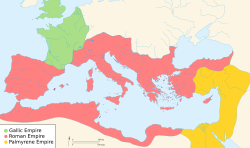Gallic Empire
| Gallic Empire | ||||||||||
| Imperium Galliarum | ||||||||||
|
||||||||||
|
The Gallic Empire under Tetricus I by 271 A.D. (in green), with the Roman Empire (in red) and the Palmyrene Empire (in yellow).
|
||||||||||
| Capital | Colonia Agrippina (260–271, modern Cologne, Germany), Augusta Treverorum (271–274, modern Trier, Germany) | |||||||||
| Languages | Latin (official), local languages such as Gaulish, Brittonic, and other languages that survived into this period | |||||||||
| Religion | Pagan (official) | |||||||||
| Government | Monarchy | |||||||||
| Emperor | ||||||||||
| • | 260–268 | Postumus | ||||||||
| • | 268 | Laelianus (usurper) | ||||||||
| • | 268 | Marius | ||||||||
| • | 268–270 | Victorinus | ||||||||
| • | 271–? | Domitianus (usurper) | ||||||||
| • | 270–274 | Tetricus I | ||||||||
| • | 270–274 | Tetricus II (Caesar, possibly Augustus 274) | ||||||||
| Historical era | Late Antiquity | |||||||||
| • | Established | 260 | ||||||||
| • | Disestablished | 274 | ||||||||
|
||||||||||
| Today part of | ||||||||||
The Gallic Empire (Latin: Imperium Galliarum) is the modern name for a breakaway part of the Roman Empire that functioned de facto as a separate state from 260 to 274. It originated during the Crisis of the Third Century.
It was established by Postumus in 260 in the wake of barbarian invasions and instability in Rome, and at its height included the territories of Germania, Gaul, Britannia, and (for a time) Hispania. After Postumus' assassination in 268 it lost much of its territory, but continued under a number of emperors and usurpers. It was retaken by Roman emperor Aurelian after the Battle of Châlons in 274.
The Roman Crisis of the Third Century continued as the Emperor Valerian was defeated and captured by the Sassanid Empire of Persia in the Battle of Edessa, together with a large part of the Roman field army in the east. This left his son Gallienus in very shaky control. Shortly thereafter, the Palmyrene Empire, which came to encompass Egypt, Syria, Judea, and Arabia Petraea also broke away.
The governors in Pannonia staged unsuccessful local revolts. The Emperor left for the Danube to attend to their disruption. This left Postumus, who was governor of Germania Superior and Inferior, in charge at the Rhine border. An exceptional administrator, Postumus had also protected the Germania Inferior against an invasion led by the Franks in the summer of 260 very well. In fact, Postumus defeated the Frankish forces at Empel so decisively, that there would be no further Germanic raids for 10 years. This all would have combined to make Postumus one of the most powerful men in the western reaches of the Roman empire.
...
Wikipedia

